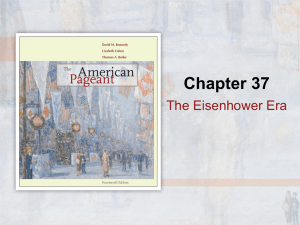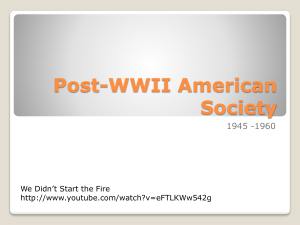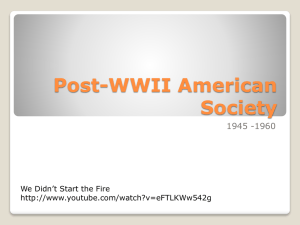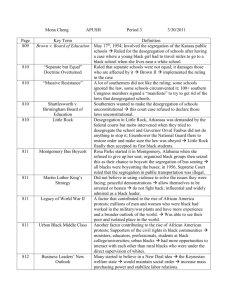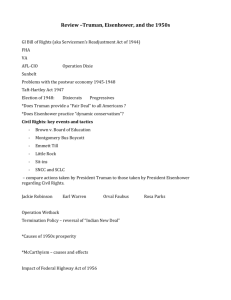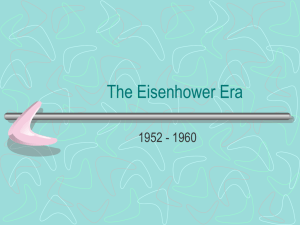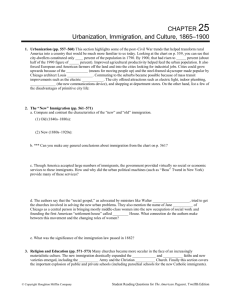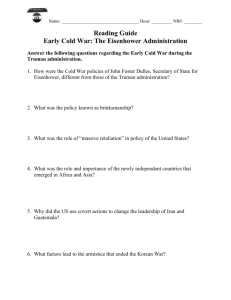CHAPTER 38 - Mt. Blue Regional District
advertisement
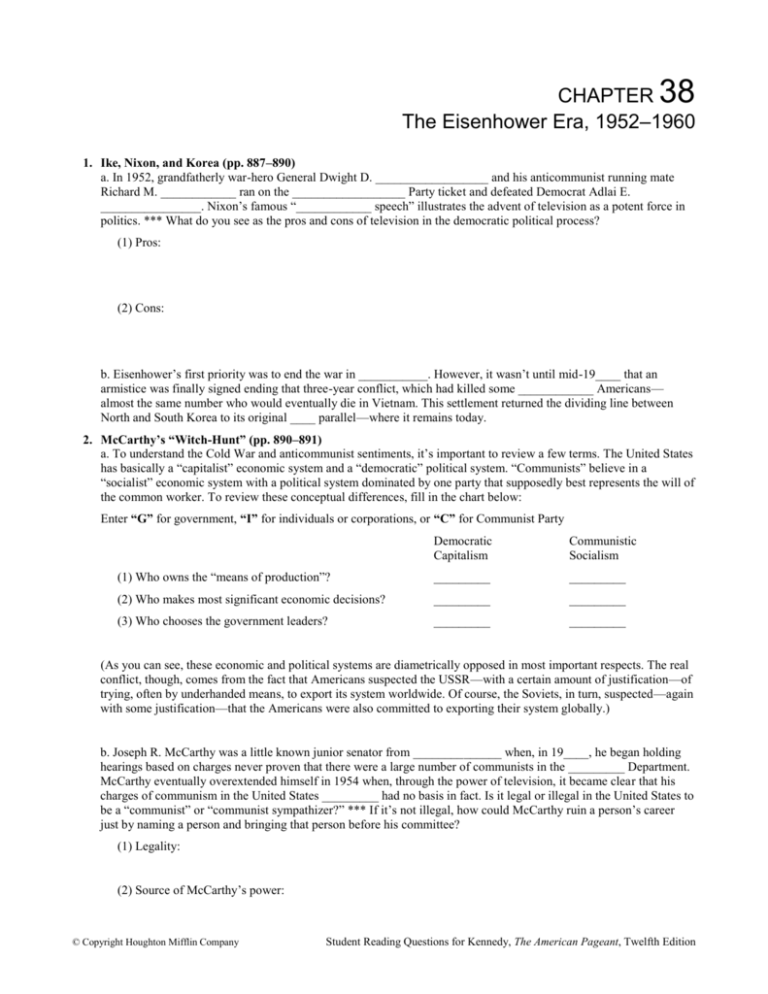
38 CHAPTER The Eisenhower Era, 1952–1960 1. Ike, Nixon, and Korea (pp. 887–890) a. In 1952, grandfatherly war-hero General Dwight D. __________________ and his anticommunist running mate Richard M. ____________ ran on the __________________ Party ticket and defeated Democrat Adlai E. ________________. Nixon’s famous “____________ speech” illustrates the advent of television as a potent force in politics. *** What do you see as the pros and cons of television in the democratic political process? (1) Pros: (2) Cons: b. Eisenhower’s first priority was to end the war in ___________. However, it wasn’t until mid-19____ that an armistice was finally signed ending that three-year conflict, which had killed some ____________ Americans— almost the same number who would eventually die in Vietnam. This settlement returned the dividing line between North and South Korea to its original ____ parallel—where it remains today. 2. McCarthy’s “Witch-Hunt” (pp. 890–891) a. To understand the Cold War and anticommunist sentiments, it’s important to review a few terms. The United States has basically a “capitalist” economic system and a “democratic” political system. “Communists” believe in a “socialist” economic system with a political system dominated by one party that supposedly best represents the will of the common worker. To review these conceptual differences, fill in the chart below: Enter “G” for government, “I” for individuals or corporations, or “C” for Communist Party Democratic Capitalism Communistic Socialism (1) Who owns the “means of production”? _________ _________ (2) Who makes most significant economic decisions? _________ _________ (3) Who chooses the government leaders? _________ _________ (As you can see, these economic and political systems are diametrically opposed in most important respects. The real conflict, though, comes from the fact that Americans suspected the USSR—with a certain amount of justification—of trying, often by underhanded means, to export its system worldwide. Of course, the Soviets, in turn, suspected—again with some justification—that the Americans were also committed to exporting their system globally.) b. Joseph R. McCarthy was a little known junior senator from ______________ when, in 19____, he began holding hearings based on charges never proven that there were a large number of communists in the _________ Department. McCarthy eventually overextended himself in 1954 when, through the power of television, it became clear that his charges of communism in the United States _________ had no basis in fact. Is it legal or illegal in the United States to be a “communist” or “communist sympathizer?” *** If it’s not illegal, how could McCarthy ruin a person’s career just by naming a person and bringing that person before his committee? (1) Legality: (2) Source of McCarthy’s power: © Copyright Houghton Mifflin Company Student Reading Questions for Kennedy, The American Pageant, Twelfth Edition 3. Early Civil Rights Movement (pp. 891–897) a. The first four paragraphs of this section paint a brief but chilling picture of life in the segregated south. *** What was your reaction after reading these paragraphs? What, if anything, surprised you in this account? b. Look over the section on “The Great African-American Migration” to the cities of the North and the West during and after the World War II. What does NAACP leader Walter White mean when he says that the war “immeasurably magnified the Negro’s awareness of the disparity between the American profession and practice of democracy”? c. The 1955–1956 bus boycott in __________________, Alabama, sparked by the refusal of Rosa _____________ to sit in the back of the bus, was led by a young, then unknown local minister named ______________ ______________ __________, Jr. With little support from either the executive or the legislative branches of government, the NAACP switched its strategy for forcing change in the South to the _____________ branch. In the landmark 19____ case of _______________ v. Board of Education of Topeka, Kansas, the Supreme Court, under Chief Justice Earl _________________, finally overturned the “separate but _____________” concept allowed by the 1896 ______________ v. Ferguson ruling. The court ruled that separate facilities in public schools were “inherently unequal” (and thus in violation of the “Equal Protection of the Laws” clause of the Fourteenth Amendment) and that the country’s public schools must be desegregated “with all deliberate speed.” Massive resistance developed in the Deep South to the implementation of this ruling. *** If—theoretically—separate facilities are the same for both races, what was the logic of the Court in declaring them “inherently unequal”? d. Eisenhower refused to lead on civil rights matters, but in 19____ he was forced to act when Governor Orval ____________ of ____________________ moved to prevent nine black students from entering ______________ High School in ____________ Rock. Eisenhower’s decision to enforce a Supreme Court ruling with which he disagreed brought about the first intervention of federal troops in southern affairs since Reconstruction. In 1957, Martin Luther King, Jr., followed up his Montgomery success by organizing the _______________ _______________ _________________ __________________ (“SCLC”). In 1960 a grassroots, student-led “_____________” movement was launched at a lunch counter in ________________, North Carolina. This movement spawned a new organization called the ______________ ____________________ ________________ _______________ (“SNCC”). Compare and contrast these two major civil rights organizations. (1) SLCC: (2) SNCC: 4. Ike at Home (pp. 897–899) Eisenhower modified some New Deal programs but left the big ones alone. He even launched the massive _______________ highway system. What do the authors say were some of the effects, pro and con, of this system that we take for granted today? © Copyright Houghton Mifflin Company Student Reading Questions for Kennedy, The American Pageant, Twelfth Edition 5. Dulles and Cold War Policy (pp. 899–902) a. What was the concept of “massive retaliation” favored by Secretary of State __________ ______________ Dulles? *** What do you think of this policy as a deterrent to potential Soviet aggression? (1) Concept of “massive retaliation”: (2) Your view: b. *** In Vietnam, why do you think that the United States, despite its general support for popular sovereignty and self-determination, financed _____ percent of the costs incurred by the ____________ in trying to reclaim their Vietnamese colony after World War II? c. The French were defeated at ____________________ in 1954. A conference was then held in ________________, which agreed to split Vietnam into two countries temporarily at the ____ parallel, with unifying elections to be held in two years. The United States then supported the corrupt but anticommunist regime of Ngo Dinh __________ in the South. *** Despite its support for democracy, why do you think the United States didn’t want the agreed 1956 elections held in Vietnam? d. Cold war tensions continued when the Soviets matched NATO with their own ____________ Pact in 1955 and crushed a nationalist rebellion in ______________________ in 1956. In the Middle East, the American CIA brazenly interfered in Iranian affairs by installing the pro-western ________ of Iran in 1953. However Eisenhower refused to support the British and French during the __________ crisis of 1956. *** After reviewing this section on American policy toward the Middle East, what do you think was (and to a large extent still is) the main objective of American policy (anticommunism, nationalism, economic interests, etc.) in that region? 6. Ike’s Second Term (pp. 902–905) a. Eisenhower was easily re-elected in 1956 against his Democratic rival Adlai _________________. In 1957, the Soviets launched the world’s first satellite, called ________________, setting off competition to build more missiles. The authors say that the United States was well advanced across a broad scientific front but that “the Soviets had gone all out for rocketry.” *** What feature of communism do you think might allow an economically weaker country like the Soviet Union to make rapid progress in a few narrow specialties? b. With both sides building more and bigger bombs, Soviet leader Nikita _______________ created another crisis in 1958 by threatening to take over the Western sectors of ___________ (the old German capital). After a goodwill visit to America in 1959, he and Eisenhower were to have met again in Paris in 1960—a meeting that was canceled after America was caught spying over Russia with a ______ (type) spy plane. © Copyright Houghton Mifflin Company Student Reading Questions for Kennedy, The American Pageant, Twelfth Edition c. America today has extensive relations with communist countries such as China and Vietnam, but not with its close neighbor Cuba. Protesting against the expropriation of American property after the 1959 Cuban revolution led by Dr. Fidel ______________, the United States cut economic and diplomatic ties, forcing the Cubans to rely even more heavily on their newfound friends in Moscow. *** Do you have any thoughts on whether this policy of isolating Cuba was good when it was enacted and whether it is still appropriate today? (1) Then: (2) Now: 7. Transition in 1960 (pp. 905–907) In the election of 1960, young Senator John F. _____________ narrowly defeated VP Richard M. ______________. This was the first election in which TV debates played a prominent role and the first to be won by a _______________ (religious faith). The authors criticize Eisenhower for not using his great popularity to further the cause of civil rights. However, they are generally positive on his leadership, pointing out the great general prosperity of the 1950s and the fact that he kept the country out of a major conflict at the height of Cold War tensions. Note though, that this peace was accompanied by a huge and unprecedented peacetime military buildup. In the box on p. 908, Eisenhower, in his farewell address, warns the country to beware of the new “militaryindustrial complex.” *** What was this “complex” and why might Eisenhower have been worried about its growing influence? (1) “Military-industrial complex”: (2) Growing influence: 8. Economic Trends (pp. 908–910) The authors here describe the construction boom in the suburbs; transformative technology advances in transistors, computers, and air travel; and the transformation of the economy from a manufacturing to a service base. Employment opportunities for women surged at a time when middle-class women were influenced by a new “cult of domesticity”—an ideal challenged by Betty _______________ in her 1963 book The Feminine _________________. *** How has the expected role of middle-class women changed between the 1950s and today? (1) 1950s: (2) Today: 9. The Consumer Culture (pp. 911–915) a. The authors describe the 1950s as a generally prosperous period when people moved to the suburbs, raised their baby-boomer children, and spent a lot on leisure time activities and mass-produced, standardized, and heavily advertised products. List some of the examples cited in the book to show new developments in each of the following areas. Consumer credit: © Copyright Houghton Mifflin Company Mass communications: Student Reading Questions for Kennedy, The American Pageant, Twelfth Edition Eating out: Popular music: Recreation/sports: Movie stars: b. Read about the “Life of the Mind.” Which listed books or plays have you read or seen? © Copyright Houghton Mifflin Company Student Reading Questions for Kennedy, The American Pageant, Twelfth Edition CHAPTER 38 TERM SHEET The Eisenhower Era Pages 887–890 Dwight D. Eisenhower Adlai E. Stevenson Richard M. Nixon “Checkers” speech (1952) Korean armistice (1952) Pages 890–891 Sen. Joseph R. McCarthy Gen. George Marshall Army-McCarthy hearings (1954) Pages 891 –897 Jim Crow laws Emmett Till (1955) Gunnar Myrdal Jackie Robinson NAACP Executive Order 8802 (1941) Walter White Thurgood Marshall Rosa Parks (1955) Montgomery bus boycott Rev. Martin Luther King, Jr. Earl Warren Brown v. Board of Education of Topeka, Kansas (1954) “Declaration of Constitutional Principals” (1956) Orval Faubus Little Rock Central High (1957) © Copyright Houghton Mifflin Company Student Reading Questions for Kennedy, The American Pageant, Twelfth Edition Southern Christian Leadership Conference (1957) Greensboro “sit-ins” (1960) Student Non-Violent Coordinating Committee (1960) Pages 897–899 Bracero program “Operation Wetback” (1954) “Indian New Deal” (1934) Interstate Highway Act (1956) AF of L and CIO merger (1955) Pages 899–902 John Foster Dulles Strategic Air Command (SAC) “Massive retaliation” Nikita Khrushchev Geneva summit (1955) Hungarian uprising (1956) Ho Chi Minh Dienbienphu (1954) Geneva Conference (1954) Ngo Dinh Diem Warsaw Pact (1955) Shah of Iran (1953) Suez crisis (1956) Eisenhower Doctrine (1957) OPEC (1960) Pages 902–905 James R. Hoffa Landrum-Griffin Act (1959) Sputnik (1957) Intercontinental ballistic missiles (ICBMs) © Copyright Houghton Mifflin Company Student Reading Questions for Kennedy, The American Pageant, Twelfth Edition “Missile gap” National Aeronautics and Space Administration (NASA) National Defense and Education Act (1958) Lebanon intervention (1958) “Spirit of Camp David” (1959) U-2 spy plane (1960) Guatemalan intervention (1954) Fulgencio Batista Fidel Castro (1959) Pages 905–907 Richard Nixon “Kitchen debate” Henry Cabot Lodge, Jr. John F. Kennedy Lyndon B. Johnson “New Frontier” Nixon-Kennedy TV debates (1960) Twenty-second Amendment (1951) Admission of Alaska and Hawaii (1959) Pages 908–910 Betty Friedan Pages 911–915 Television Billy Graham, Oral Roberts, Fulton Sheen Elvis Presley Marilyn Monroe © Copyright Houghton Mifflin Company Student Reading Questions for Kennedy, The American Pageant, Twelfth Edition Social critics: David Riesman William H. Whyte, Jr. Sloan Wilson John Kenneth Galbraith Daniel Bell C. Wright Mills Novelists: Ernest Hemingway John Steinbeck Norman Mailer James Jones Joseph Heller Kurt Vonnegut, Jr. John Updike John Cheever Louis Auchincloss Gore Vidal Poets: Ezra Pound Wallace Stevens William Carlos Williams Theodore Roethke Robert Lowell Sylvia Plath Anne Sexton John Berryman Playwrights: Tennessee Williams Arthur Miller Lorraine Hansberry Edward Albee Black/southern authors: Richard Wright Ralph Ellison James Baldwin LeRoi Jones William Faulkner Walker Percy Eudora Welty Robert Penn Warren Flannery O’Connor William Styron Jewish writers: J. D. Salinger Bernard Malamud Philip Roth Saul Bellow E. L. Doctorow © Copyright Houghton Mifflin Company Student Reading Questions for Kennedy, The American Pageant, Twelfth Edition
